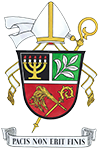
KERIO VALLEY
The first missionaries in the Kerio Valley were the Mill Hill and the Kiltegan Fathers. They rooted the Christian faith by founding a small Christian community in Chesongoch. The Benedictines took over the responsibility of evangelisation among the Marakwets in 1972. For the running of the mission, a kind of base or warehouse was needed in Eldoret town. So, the Benedictines tried to combine such a house with the care of Majengo parish which they took over on 12th January 1973. Father Reinhard Bottner and Father Hilderbrand started this work. After a short period of time, they came to realize that the parish house did not serve the purpose and they bought a new one in the eastern estate of Eldoret town. Since 1975, Father Paul Durr was working as the procurator.
As the increasing work of the parish could not be managed by Father Hilderbrand alone anymore since Father Reinhard left for another assignment, the Benedictines gave back the parish to the Catholic Diocese of Eldoret in 1976 in order to be able to lay more emphasis on the mission in Kerio Valley.
The missionaries had a special way of evangelizing; they respected and learnt the culture of the people and thereafter they owned and became part of the Marakwet culture. They understood that people liked snuff or smokeless tobacco and they could tell them to go to church and after Mass, they could get a share of it and some clothes.
The missionaries opened Kerio Valley to the rest of the country by opening the roads from the bush. They discovered fresh water from the top of the hill and embarked on the project by piping the water system to almost all parts of the valley. They discovered that the climate in the valley favoured the growth of some crops and so they ventured into agriculture by planting fruit trees like mangoes, pawpaws, oranges and lemon. These trees transformed the valley into a “green city” and despite the high temperatures over there, the trees played an important role in temperature regulation and made the place more habitable. They introduced tailoring by training women and girls how to make clothes. Since they value education, they built several primary and secondary schools all over the valley so that the children could acquire education. They also sponsored many students for education. They also built quite a number of health centres, dispensaries and hospitals. They did all these activities throughout all the parishes they established. Brother Laurenti is famously remembered for having done almost all the construction of the parishes throughout Kerio Valley. To date, more than 95% of the population of Kerio Valley is practising the Catholic faith.
